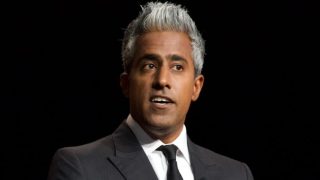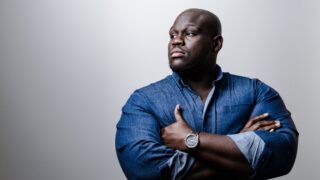And Other Helpful Recommendations on How to Become American
The Lavin Agency Speakers Bureau
A speakers bureau that represents the best original thinkers,
writers, and doers for speaking engagements.
A speakers bureau that represents the best original thinkers,
writers, and doers for speaking engagements.
When we share our stories, we create an inclusive world—and build a multicultural coalition of the willing.
How do we build a compassionate and inclusive America in an age of distrust? Wajahat Ali knows from personal experience that when we come together to be the superheroes of our own stories, we can create honest social change. The beloved TED speaker has written for the New York Times, the Washington Post, and The Atlantic about our urgent issues—immigration, politics, parenthood—with boldness, hope, and humor. His memoir Go Back to Where You Came From, one of Amazon’s Best Books of the Year, follows his life as a Muslim Pakistani-American on a surprising, emotional, and challenging quest for the good life. Iconic journalist Katie Couric says that “we are all so fortunate to be on the receiving end of his intellect, his humanity, and his heart.” A dynamic and hilarious presenter, Waj brings a unique sense of humor and empathy to his talks.
In his memoir Go Back to Where You Came From: And Other Helpful Recommendations on How to Become American, Wajahat Ali teaches us how to create our own superhero origin story, invest in hope for the future of America, and enact real social change. The book was called “biting and funny and full of heart” by NPR. Representative Ilhan Omar called Wajahat’s work “hilarious” and “deeply moving”, and legendary writer Dave Eggers said it was the book he’d “been hoping Wajahat Ali would write for ten years—hilarious, stylistically fearless, deeply humane.”
Wajahat is also the author of The Domestic Crusaders—the first major play about Muslim-Americans in a post-9/11 world. He was the lead researcher and author for the Center for American Progress’s seminal report “Fear Inc., Roots of the Islamophobia Network in America,” and served as a national correspondent for Al Jazeera America, where he told stories about communities and individuals often marginalized or under-reported in mainstream media. A lawyer and the child of immigrants, Waj has a unique insight into the political and social impacts of immigration, and how to foster belonging in a world of constant movement.
As Creative Director of Affinis Wajahat Labs, he worked to create social entrepreneurship initiatives to support and uplift marginalized communities. He also worked with the US State Department to design and implement the “Generation Change” leadership program to empower young social entrepreneurs. Wajahat initiated chapters in eight countries, including Pakistan and Singapore. For his work, he was honored as a “Generation Change Leader” by Sec. of State Clinton and recognized as an “Emerging Muslim American Artist” by the Muslim Public Affairs Council.
He has given keynote speeches around the world such as TED, The Aspen Ideas Festival, Google, the United Nations, and The New Yorker Festival. His writing appears regularly in the New York Times, The Atlantic, the Washington Post, and The Guardian. He’s a Senior Fellow at The Western States Center and Auburn Seminary and co-host of Al Jazeera’s The Stream.
Everything was amazing! Waj's session was great. We couldn’t have asked for a better speaker on this topic. Lavin was a wonderful partner and I hope we can work together in the future.
UScellular Inclusion SummitWaj got great reviews from the audience at the Client Advisory Forum. They felt he had a great message and loved how he tied in humor. We can’t thank him enough.
NavitusWajahat was an outstanding speaker—one of the most engaging we have had in recent years. What made him so perfect was that he had both a deep sense of social justice and a great sense of humor. He made the evening.
Legal Aid at WorkTheoretical Physicist and Novelist Internationally Bestselling Author of Einstein's Dreams
Director of The Muslims Are Coming! Author of How to Make White People Laugh
#1 New York Times bestselling author of Zealot and An American Martyr in Persia Distinguished Professor, UC Riverside

Author, Private Equity
Expert in the Psychology of Negotiations | Associate Professor, UCL School of Management | Associate Fellow at Oxford's Saïd Business School

Internationally bestselling author of Winners Take All and The Persuaders Former New York Times foreign correspondent MSNBC political analyst

Founder of the "I Matter" Poetry and Art Competition Teen Vogue 21 Under 21 Honoree Winner of the Princeton Prize in Race Relations

Former Mayor of Baltimore Founder, SRB & Associates

Author, We Refuse to Forget and BLACK MOSES Contributing Writer, The New York Times Magazine Associate Professor, Northeastern University

Author of Grit, the #1 New York Times Bestseller | Pioneering Researcher on Grit, Perseverance, and the Science of Success

2024 Nobel Prize Winner | 3rd Most Cited Economist in the World | MIT Institute Professor | Bestselling Co-Author of Why Nations Fail and Power and Progress

Pulitzer Prize-Winning Creator of The 1619 Project | Executive Producer of the Emmy Award-Winning 1619 Project Hulu Docuseries | MacArthur Genius
Nike's Former Chief Marketing Officer | Author of Emotion by Design
CEO of The Atlantic | Former Editor-in-Chief of WIRED


With rising anti-Muslim and anti-Arab bigotry in the US, our communities, workplaces and universities are struggling to respond to hate, ignorance, and misinformation. What can we do, and how can we move forward?
In this talk, Wajahat Ali reveals the true nature of this complex issue, how it intersects with other forms of bigotry such as antisemitism, and how we can overcome it to build respectful, pluralistic communities and democracies. He draws on his personal story as a Muslim American, as well as his professional experience as the lead author and researcher of the Center for American Progress report Fear, Inc.: The Roots of the Islamophobia Network in America.
Wajahat passionately makes the case for how Americans—of all ethnicities and religious persuasions—can and must unite to ensure that this scapegoating never happens to anyone else, regardless of race, orientation, religion, or creed. We must look to our past to pave the way for a dynamic, bold future for all of our children and future generations.

